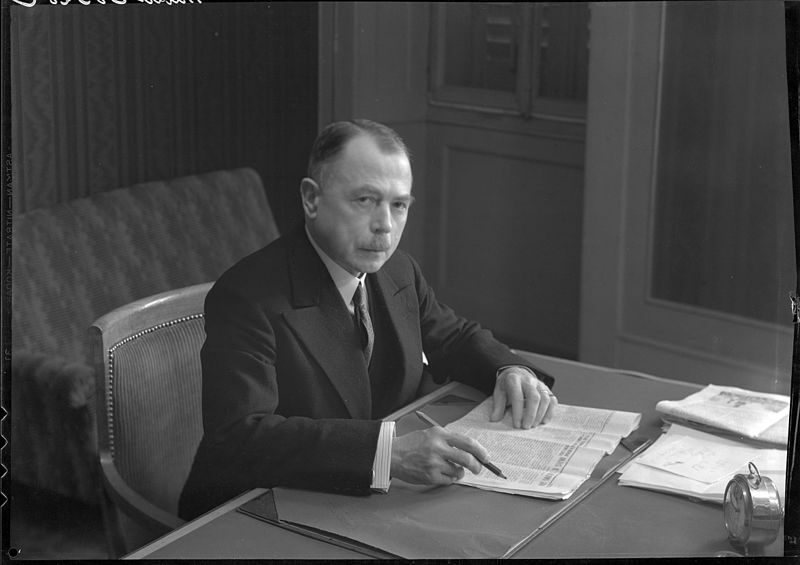Théodore Aubert was born in Geneva on September 8, 1878, the son of Henri Aubert, who worked at the stock exchange, and Hélène Isabelle (née Price).
After graduating from the University of Geneva, he practiced law.
From 1917 to 1919, he worked in the International Committee of the Red Cross in France and Germany (Berlin). During the 1918 general strike in Switzerland, Aubert was a founding member of a civic guard organization to oppose it. He went on to head a party called the Union de défense économique (Union for Economic Defense) from 1923 to 1925 and served as a member of the Grand Council of Geneva.¹ It was Aubert who, when the Soviet diplomat Vatslav Vorovsky was assassinated at the Conference of Lausanne in May 1923, defended and achieved an acquittal of the assassins, former Imperial Russian soldiers Maurice Konradi and Arkady Polunin.²
In March 1924, together with Yuri Lodyzhenskii, Auburt founded the International Anti-Communist League (Entente internationale contre la IIIe Internationale or EIA)³, which later became known as the Aubert League.⁴ Both Yuri Lodyzhensky and his brother Alexander were members, while the organization maintained ties with the Russian All-Military Union (ROVS), the philosopher Ivan Ilyin and the writer Ivan Shmelev⁵, and the Brotherhood of Russian Truth.⁶ From 1935 to 1939, Aubert was a member of the Swiss National Council. The EIA would last until November 1950. Aubert himself died on January 19, 1963, in Geneva.
After graduating from the University of Geneva, he practiced law.
From 1917 to 1919, he worked in the International Committee of the Red Cross in France and Germany (Berlin). During the 1918 general strike in Switzerland, Aubert was a founding member of a civic guard organization to oppose it. He went on to head a party called the Union de défense économique (Union for Economic Defense) from 1923 to 1925 and served as a member of the Grand Council of Geneva.¹ It was Aubert who, when the Soviet diplomat Vatslav Vorovsky was assassinated at the Conference of Lausanne in May 1923, defended and achieved an acquittal of the assassins, former Imperial Russian soldiers Maurice Konradi and Arkady Polunin.²
In March 1924, together with Yuri Lodyzhenskii, Auburt founded the International Anti-Communist League (Entente internationale contre la IIIe Internationale or EIA)³, which later became known as the Aubert League.⁴ Both Yuri Lodyzhensky and his brother Alexander were members, while the organization maintained ties with the Russian All-Military Union (ROVS), the philosopher Ivan Ilyin and the writer Ivan Shmelev⁵, and the Brotherhood of Russian Truth.⁶ From 1935 to 1939, Aubert was a member of the Swiss National Council. The EIA would last until November 1950. Aubert himself died on January 19, 1963, in Geneva.

Théodore Aubert (1878-1963)
Théodore Aubert
Source
Source

Content Oriented Web
Make great presentations, longreads, and landing pages, as well as photo stories, blogs, lookbooks, and all other kinds of content oriented projects.
[1] Bron, Marie. ‘Théodore Aubert’. Historische Lexikon der Schweiz HLS, 26 November 2001. https://hls-dhs-dss.ch/de/articles/006155/2001-11-26/.
[2] Chistyakov, Kirill. ‘Pokusheniya M. Konradi na glavu sovetskoy delegatsii V.V. Vorovskogo v Lozanne 10 maya 1923 g.’ Novyy istoricheskiy vestnik, no. 6 (2002). https://cyberleninka.ru/article/n/pokushenie-m-konradi-na-glavu-sovetskoy-delegatsii-v-v-vorovskogo-v-lozanne-10-maya-1923-g.
[3] Serapionova, Yelena. ‘Antikominternovskaya deyatel’nost’ Russkoy sektsii Ligi Teodora Obera v Bolgarii (1924–1934 gody)’. Studia Balkanica: K yubileyu R. P. Grishinoy, 2010, 196–215. https://inslav.ru/sites/default/files/editions/2010_studia_balkanica.pdf.
[4] Bogomazov, Nikolay. ‘“Otkaz sovetskogo pravitel’stva proizvedet udruchayushcheye vpechatleniye”: popytka Krasnogo Kresta poluchit’ razresheniye na poseshcheniye sovetskikh tyurem i lagerey’. NIR, no. 3(8) (2013). https://cyberleninka.ru/article/n/otkaz-sovetskogo-pravitelstva-proizvedet-udruchayuschee-vpechatlenie-popytka-krasnogo-kresta-poluchit-razreshenie-na-poseschenie.
[5] Grishun’kina, Marina. ‘The new publication of documents on history of antibolshevik military emigration’. Novyy istoricheskiy vestnik, no. 25 (2010).https://cyberleninka.ru/article/n/the-new-publication-of-documents-on-history-of-antibolshevik-military-emigration.
[6] Bazanov, Petr. Bratstvo Russkoy Pravdy – samaya zagadochnaya organizatsiya Russkogo Zarubezh’ya. Moskva: Posev, 2013.